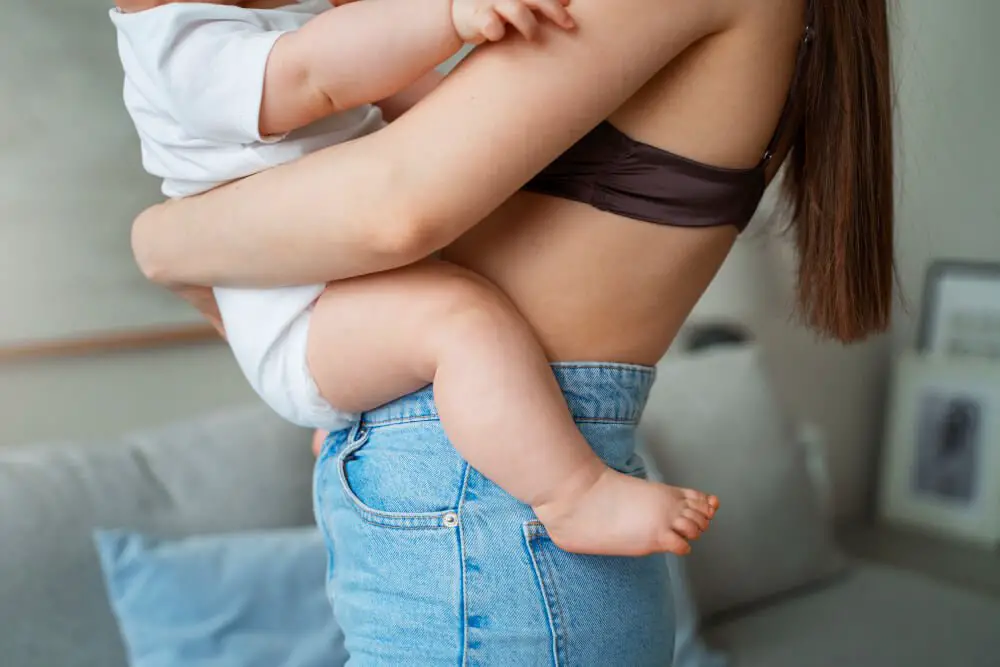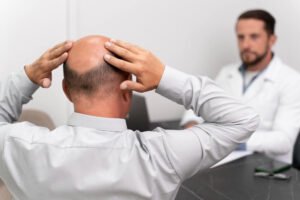Effective Postpartum Hair Loss Treatment Strategies
Welcoming a new life into the world is a wondrous journey, but for many new mothers, it’s accompanied by an unexpected visitor: postpartum hair loss. The locks that once radiated during pregnancy may now feel like they’re escaping in clumps, and the bathroom floor might seem like a battleground of fallen strands. It’s a bewildering experience, and you’re not alone in your concern.
Understanding Postpartum Hair Loss
As a new mother, you’ve embarked on a hormonal roller coaster, and your hair is hitching a ride too. During pregnancy, the surge of estrogen keeps your hair in a prolonged growth phase, resulting in luscious locks that often become the envy of others. However, after childbirth, those hormone levels drop, causing many hairs to enter the resting phase, also known as “telogen.” This transition from growth to rest is the culprit behind postpartum hair loss, scientifically termed Telogen Effluvium.
When Does Postpartum Hair Loss Happen?
Don’t be surprised if you don’t see the full extent of hair loss immediately after giving birth. It’s like a sneak attack, with peak shedding happening around four to five months postpartum. So, just as you’re starting to regain your footing in the world of diaper changes and sleepless nights, your hair seems to have other plans.
Why Does Postpartum Hair Loss Happen?
Your body’s hormonal symphony takes center stage during pregnancy. Estrogen, the hormone responsible for your hair’s pregnancy glow, keeps it in the growth phase for a prolonged period. But once the curtain falls on pregnancy, estrogen levels plummet, and a mass exodus of hair from the growth phase to the shedding phase occurs. This synchronization of the hair’s life cycle leads to the significant hair loss that often catches new mothers off guard.
Treatment Strategies for Postpartum Hair Loss
While the sight of hair in the shower drain might be distressing, the good news is that postpartum hair loss is generally temporary. Your body is designed to bounce back, and your hair is no exception. Most mothers notice their hair regaining its fullness by the time their little one celebrates their first birthday.
However, there’s no shortage of advice and treatments that promise miraculous regrowth. Yet, the true remedy often lies in letting nature take its course. Embrace a balanced diet rich in nutrients, including vitamins and minerals that support hair health. After all, your hair is a reflection of your inner well-being.
Gentle Hair Care Routine
In your journey toward embracing your changing hair, remember that gentleness is key. Choose hair care products that nurture rather than stress your tresses. Opt for volumizing shampoos and lightweight conditioners to avoid weighing down your hair. And when it comes to washing, brushing, and styling, treat your hair like a delicate treasure. Avoid tight hairstyles that tug at the roots, and be extra gentle while detangling.
New Hairstyles to Boost Confidence
If you’re yearning for a confidence boost while waiting for your hair to regain its fullness, consider a new hairstyle. A fresh cut can add volume and a renewed sense of self. Experiment with different lengths and layers, playing with the canvas that is your hair.
Hair Growth Stimulation Techniques
Boosting hair growth isn’t about finding a magical elixir; it’s about embracing simple practices that support your body’s natural processes. Indulge in a soothing scalp massage to enhance blood circulation and awaken dormant follicles. Don’t underestimate the power of a well-designed brush. Opt for brushes with natural bristles that pamper your scalp as they untangle knots.
The Psychological Impact
Beyond the physical changes, postpartum hair loss can take an emotional toll. Your hair is intricately tied to your identity, and the sight of shedding strands might shake your confidence. It’s essential to remember that your worth transcends your appearance. Surround yourself with a support system that understands your journey, and practice self-care that nourishes your soul.
Disclaimer: The information provided in this article is for informational purposes only and should not be considered as medical advice. Always consult with a qualified healthcare professional before making any decisions regarding your health or treatments. For more information, please read our Medical Disclaimer.
Frequently Asked Questions:
- What are the best vitamins for hair growth? Vitamins like Biotin, Vitamin D, and Vitamin E can promote hair health and growth.
- Can stress worsen postpartum hair loss? Yes, stress can contribute to hair loss. Finding ways to manage stress is important for overall well-being.
- Is postpartum hair loss permanent? No, postpartum hair loss is usually temporary and should resolve within several months.
- Can postpartum hair loss be prevented? While you can’t prevent it entirely, maintaining a healthy lifestyle and hair care routine can minimize its impact.
- What role does genetics play in postpartum hair loss? Genetics can influence the extent of hair loss, but following a healthy lifestyle can still make a difference.
References:
- Hormonal Changes During Pregnancy and Hair Growth, Journal of Dermatology, 2020.
- Telogen Effluvium: A Comprehensive Review, Dermatology and Therapy, 2019.
- Nutrition and Hair Health: Evidence-Based Approach, Journal of Clinical and Aesthetic Dermatology, 2016.
- Stress and Hair Loss: A Systematic Review, Dermatology and Psychosomatics, 2018.
- The Genetics of Hair Disorders, Journal of Investigative Dermatology Symposium Proceedings, 2018.




